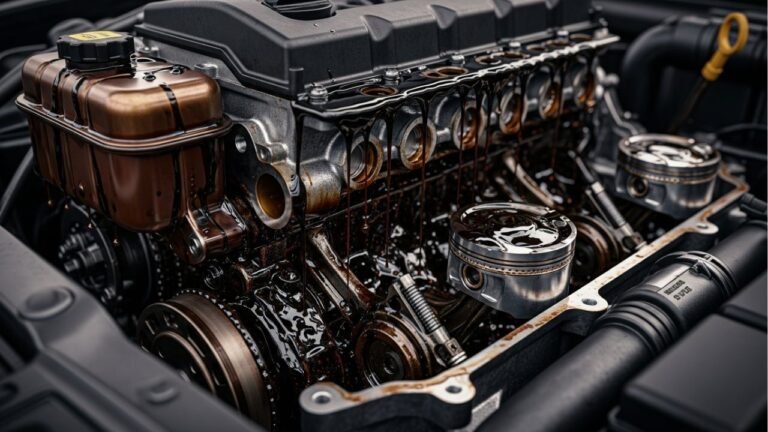Total Car Engine Oil: The Lifeblood of Your Vehicle’s Heart

Let’s be honest—engine oil probably isn’t the most exciting thing you think about when it comes to your car. Most of us only give it a passing glance when that little light flashes on the dashboard. But what if I told you that total car engine oil is the heartbeat of your vehicle, keeping everything flowing smoothly, quietly, and efficiently?
Think of it like this: your engine is a hardworking heart, pumping power and energy every second you’re on the road. And just like our hearts need clean blood to function properly, your engine needs the right oil to stay alive and healthy. Without proper lubrication, your car will grind to a halt—literally.
In this article, we’re going to explore total car engine oil from the ground up. I’ll walk you through what it is, how it works, why it matters, and how to choose the right one. Plus, I’ll share some of my personal stories (including a disaster involving a road trip and the wrong oil!) to make this less of a lecture and more of a friendly fireside chat.
In This Article
- 1 What Is Total Car Engine Oil and Why Is It Special?
- 2 How Does Engine Oil Actually Work? (And Why You Should Care)
- 3 Types of Total Car Engine Oil: Which One Do You Need?
- 4 Viscosity Matters More Than You Think
- 5 The Real Cost of Ignoring Oil Quality
- 6 When Should You Change Total Car Engine Oil?
- 7 How to Choose the Right Total Oil for Your Car
- 8 Total vs. Other Brands: What Makes It Stand Out?
- 9 How to Change Your Oil at Home (Even If You’re Not a Mechanic)
- 10 Common Myths About Engine Oil You Need to Forget
- 11 Frequently Asked Questions (FAQs)
- 11.1 1. Is Total car engine oil good for all car brands?
- 11.2 2. Can I use Total Quartz 9000 in my high-mileage car?
- 11.3 3. How often should I change Total synthetic oil?
- 11.4 4. Where can I buy Total engine oil?
- 11.5 5. Is Total oil safe for diesel engines?
- 11.6 6. Can I switch from another brand to Total?
- 11.7 7. Does Total offer eco-friendly oil options?
- 11.8 8. Does Total oil help with fuel economy?
- 12 Final Thoughts: Give Your Car the Love It Deserves
What Is Total Car Engine Oil and Why Is It Special?

But what makes Total engine oil stand out?
-
Superior additive technology: It’s packed with special chemical compounds that clean the engine and reduce wear.
-
High thermal stability: Keeps the engine safe in extreme heat.
-
Low ash content: Helps protect the catalytic converter in newer cars.
-
Broad compatibility: Works well in both gasoline and diesel engines.
From synthetic blends to full synthetics and even mineral options, Total car engine oil is like a well-tailored suit—there’s one for every kind of engine out there.
When I first tried Total Quartz 9000 Energy 5W-40 for my aging Honda Civic, I noticed a smoother engine sound almost immediately. The difference was night and day. No more sluggish starts on cold mornings or clunky acceleration uphill.
How Does Engine Oil Actually Work? (And Why You Should Care)
Here’s a simple way to look at it. Engine oil has five main jobs:
-
Lubrication – Reduces friction between metal parts.
-
Cooling – Helps move heat away from hot engine areas.
-
Cleaning – Traps dirt, soot, and sludge.
-
Protecting – Prevents corrosion and wear.
-
Sealing – Assists piston rings in sealing cylinders tightly.
Now imagine if just one of these functions failed. Your engine could overheat, parts could grind and break, or sludge could clog important pathways. It’s a domino effect—and you don’t want to be on the wrong end of it.
Total car engine oil is engineered to handle all of these roles with precision. It’s not just oil—it’s a multitasking champion.
Here’s a real-life comparison: I once used a cheap, off-brand oil for a quick top-up. Within two weeks, my car started vibrating at idle. Turns out, the oil had gummed up my valve lifters. After flushing and switching to Total Quartz, my engine calmed down, and the performance shot back up. Lesson learned the hard way!
Types of Total Car Engine Oil: Which One Do You Need?
Choosing the right Total car engine oil can feel like navigating a menu in a foreign language. Here’s a simplified breakdown of their major categories:
| Type of Total Oil | Viscosity Rating | Ideal For | Key Benefit |
|---|---|---|---|
| Quartz 9000 Energy | 5W-40 | Older gasoline engines | Superior protection and wear reduction |
| Quartz 7000 | 10W-40 | Gasoline/diesel mixed-use vehicles | Strong detergent additives |
| Quartz Ineo Long Life | 5W-30 | Modern engines with emission systems | Low SAPS, protects diesel particulate filter |
| Quartz 5000 | 15W-40 | Older or high-mileage cars | Reliable performance at a lower cost |
Each oil type has a purpose. If you’re using the wrong one, you could be hurting your engine without even knowing it.
Pro Tip: Check your owner’s manual and match the viscosity recommendation. Most modern cars use 5W-30 or 5W-40, but climate and mileage matter too.
Viscosity Matters More Than You Think
Let’s talk viscosity. I used to think this was just a nerdy number on the bottle. But it actually means a lot.
Viscosity is the thickness of the oil. The “5W” means it flows well in winter (W), and the second number (like 30 or 40) tells you how thick it stays at high temperatures.
Why does this matter?
-
Too thick, and it won’t flow fast enough to protect cold engine parts.
-
Too thin, and it won’t provide enough cushion under heat.
Total car engine oil comes with finely balanced viscosity options that protect your engine from cold starts to highway speeds.
I remember a friend of mine poured 20W-50 into his small hatchback during a summer trip. Within days, his mileage dropped, and the car felt like it was dragging. Switching back to the recommended 5W-30 from Total fixed the issue almost instantly. Moral of the story: trust the specs!
The Real Cost of Ignoring Oil Quality
Let me share a quick story. My cousin Rafi owns a used Toyota Corolla. He was always putting off oil changes or buying random brands from gas stations to save a few bucks. One day on the highway, his engine completely seized. The culprit? Dirty, degraded oil that hadn’t been changed in nearly a year.
He ended up spending over $1,500 on repairs—more than what the car was worth.
Cheap or delayed oil changes cost more in the long run.
Here’s what you risk:
-
Engine overheating
-
Lower fuel efficiency
-
Permanent internal damage
-
Burnt oil smell and smoke
-
Shorter engine life
On the other hand, Total car engine oil is designed for extended drain intervals, meaning you can go longer between oil changes without worrying. It also contains detergents to clean your engine while it runs.
That peace of mind? Worth every drop.
When Should You Change Total Car Engine Oil?
This depends on the type of oil, your car, and how you drive.
But here are general rules of thumb:
-
Every 5,000 – 7,500 km for conventional oils
-
Every 10,000 – 15,000 km for synthetic oils (like Quartz 9000)
-
Every 6 – 12 months if you don’t drive often
You should also change it sooner if:
-
You drive in dusty or stop-and-go traffic.
-
Your car frequently tows or hauls heavy loads.
-
You notice your oil is dark, gritty, or smells burnt.
Still not sure? Look for these warning signs:
-
Oil light on dashboard
-
Noisy engine or ticking sound
-
Rough idling or stalling
-
Reduced mileage
Keeping a routine oil change schedule using Total car engine oil can help your engine feel like new for years.
How to Choose the Right Total Oil for Your Car
So, how do you know which Total car engine oil is the perfect match for your vehicle? It’s not as confusing as it might seem. Choosing the right oil is like picking the right kind of food for your body—it has to fit your car’s “diet.”
Here’s how you can make the right call:
1. Check Your Owner’s Manual
Every car has its own oil requirements. Your manual will tell you the exact viscosity (like 5W-30) and whether you need synthetic, semi-synthetic, or mineral oil.
2. Understand Your Driving Habits
-
City driver? You need oil with high detergent content like Total Quartz Ineo to combat stop-start wear.
-
Long highway trips? Go for a fully synthetic option like Quartz 9000 Energy.
-
Own an old or high-mileage car? Choose something like Quartz 5000 which offers better wear protection.
3. Consider the Climate
If you live in a cold climate, pick a low “W” oil for better cold starts (5W or 0W). For hotter climates, a higher second number (like 40 or 50) will prevent thinning.
4. Look at Manufacturer Approvals
Total oils come with a long list of OEM approvals—BMW, Mercedes-Benz, Volkswagen, Renault, Peugeot, and more. It’s always a good sign when automakers themselves recommend it.
When I switched my daily commuter to Total Quartz Ineo Long Life 5W-30, not only did I feel a change in performance, but I noticed fewer oil top-ups between services. Sometimes, the car really does “thank” you.
Total vs. Other Brands: What Makes It Stand Out?
Now, this is where it gets interesting. There are tons of motor oil brands out there—Castrol, Mobil 1, Shell, Valvoline. So, why should you choose Total car engine oil over the rest?
Let’s break it down in this honest, side-by-side view:
| Brand | Performance | Eco-Friendly | Price Range | OEM Approvals | Detergent Quality |
|---|---|---|---|---|---|
| Total | High | ✅ Excellent | ✅ Strong | Excellent | |
| Castrol | High | ⚠️ Moderate | ✅ Strong | Good | |
| Mobil 1 | Premium | ✅ Excellent | ✅ Excellent | Good | |
| Shell Helix | Good | ⚠️ Moderate | ✅ Strong | ⭐ Moderate |
Total car engine oil consistently balances performance, price, and environmental consciousness. And for folks like me who drive daily in chaotic city traffic, that balance really matters.
Another bonus? Total is committed to reducing carbon emissions and offers low-SAPS (Sulphated Ash, Phosphorous, and Sulfur) oils that protect your catalytic converters.
How to Change Your Oil at Home (Even If You’re Not a Mechanic)
You don’t need a garage or a lift to do your own oil change. If you can make noodles, you can change your oil. Okay, maybe not that easy—but close!
Here’s What You Need:
-
Total car engine oil (right viscosity & type)
-
New oil filter
-
Wrench set
-
Funnel
-
Oil catch pan
-
Rubber gloves
-
Jack & jack stands (or ramps)
Step-by-Step:
-
Warm up the engine for 5 minutes. This helps the oil flow out easily.
-
Jack up the car and secure it safely.
-
Remove the drain plug and let the old oil drain into the pan.
-
Remove the old oil filter—be careful, it’s messy.
-
Install the new filter, adding a little new oil on the rubber gasket.
-
Replace the drain plug once all old oil has drained.
-
Pour in fresh Total oil through the oil cap using a funnel.
-
Check oil level using the dipstick.
-
Run the engine for 2–3 minutes and check for leaks.
-
Dispose of the old oil properly. Never dump it down the drain!
Changing your oil is empowering. The first time I did it, I felt like a DIY superhero. Just be patient, and always double-check your oil type.
Common Myths About Engine Oil You Need to Forget
Let’s clear up some of the oily gossip floating around car circles.
❌ Myth 1: “You must change oil every 3,000 km.”
Nope. Total synthetic oils can go up to 10,000–15,000 km. Don’t waste your money.
❌ Myth 2: “Darker oil means it’s bad.”
Not true. Oil naturally darkens as it cleans the engine. Color doesn’t always equal quality.
❌ Myth 3: “Mixing brands is okay.”
You can mix brands in an emergency, but it’s not ideal. Stick with one oil line—like Total Quartz—for consistent protection.
❌ Myth 4: “Synthetic oil causes leaks in old cars.”
Wrong again. It actually helps reduce sludge and improve performance, especially if you use a high-mileage formula from Total.
Frequently Asked Questions (FAQs)
1. Is Total car engine oil good for all car brands?
Yes. Total offers oils approved by most global manufacturers including Toyota, BMW, Ford, Nissan, Renault, and more.
2. Can I use Total Quartz 9000 in my high-mileage car?
Absolutely. It’s perfect for older engines, especially those that need stronger protection and cleaning properties.
3. How often should I change Total synthetic oil?
Most Total synthetic oils last up to 10,000 to 15,000 kilometers, but check your manual for your specific model.
4. Where can I buy Total engine oil?
You can find it at authorized auto parts stores, online marketplaces, and sometimes even at your dealership’s service center.
5. Is Total oil safe for diesel engines?
Yes. Total makes multi-fuel compatible oils, including options like Quartz Ineo that are designed for diesel with DPF systems.
6. Can I switch from another brand to Total?
Yes, but it’s good practice to do an engine flush or oil system cleaner if you’re switching oil types.
7. Does Total offer eco-friendly oil options?
Yes! Total Quartz Ineo oils are made to reduce emissions and protect catalytic systems, supporting cleaner engine operations.
8. Does Total oil help with fuel economy?
Definitely. With friction-reducing additives, many Total car engine oils are designed to boost mileage and lower consumption.
Final Thoughts: Give Your Car the Love It Deserves
If there’s one lesson I’ve learned after two decades behind the wheel, it’s this: your car will only treat you as well as you treat it.
Using Total car engine oil is a small investment with huge payoffs—better performance, longer engine life, fewer repairs, and greater peace of mind. Whether you’re commuting daily in a busy city or hitting the open road on weekend getaways, the right engine oil makes all the difference.
So the next time your oil light flickers, don’t ignore it. Give your engine the care it deserves. Choose quality. Choose longevity. Choose Total.






